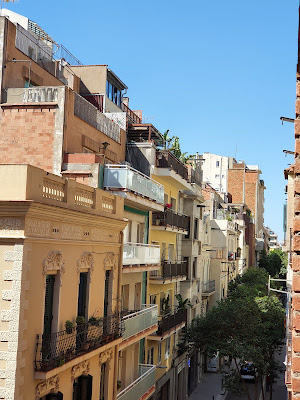Back in October 2017, I remember becoming aware of a Scottish Festival of Creative Ageing, organised under the umbrella of an organisation called Luminate. You can still have a look at the brochure online. I went to one of the 2017 events: a Creative Ageing Day in Ayr Town Hall.
It was described as 'A fun, explorative event which aims to generate some genuinely creative thinking through a range of hands-on workshops, performances, talks and screenings of short films. There will also be a marketplace to promote local opportunities for creative learning, arts and cultural activities.'
It certainly was a fun day, most notably because it seemed to involve mostly older people doing their own creative thing. By themselves, for themselves, with plenty of enthusiasm and skill.
A glance through the brochure for the whole festival shows a variety of excellent events run by all kinds of groups throughout Scotland. There was Irvine Community Art Club, 'a group of retired people who share a passion for art.' There was traditional jazz, a life affirming drama about a son accompanying his elderly father on a trip back to India, and an inter-generational photography project. There was an event called Celebrate National Grandparents Day by taking part (with your grandchildren) in a workshop run by an experienced traditional carpenter. This included 'A chance to use axes, draw knives and chisels in an appropriate and safe manner to make a small piece to take home.' There were tapestry and other craft workshops for adults and children or grandchildren, a workshop on Muriel Spark, something called Thrawn Craws, a Murder of Writers aged between 40 and 80, committed to writing for older actors. ('We invite you to join us as we present important stories about the many facets of love in contemporary Scotland.') There were dance classes for the over 60s and Prime, an over-60s semi-professional company presented a series of bespoke two minute solos, created by top Scottish choreographers for individual company members.
The whole programme was full of interesting, exciting, entertaining events with the aim of showing that older people are already wise and creative, and that when you provide opportunities and mix up the generations, without patronising, something wonderful can happen.
Do you spot the difference? The way in which the whole venture has become didactic (Creativity for carers, anyone?) rather than exciting and inspirational.
What went wrong? How, in five short years, could something that was so vibrant, so interesting, and so positive become a project almost wholly aimed at facilitating (they're very fond of that word) younger creatives to teach us poor oldies how to be creative in our dotage. The creative practitioner as a sort of cut price social worker promoting our 'wellbeing' (another buzz word) whether we want it or not.
Why and how did this happen? Was it a political decision? If so, it was a bad one. The creative arts are always worth engaging with, in and for themselves, not as some kind of short cut to 'mental health'.
All I know is that something that started out full of life and vibrancy, seems to have become stodgy, pedestrian and faintly patronizing. 'Let's find something for the poor old folks to do' and 'let's train our young creatives to facilitate them.'
Am I alone in finding this profoundly depressing? Especially compared with how it all began?






